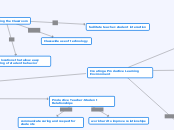Creating a Productive Learning Environment
Addressing Aggression and Violence at School
Gang Related Problems
Forbid clothing or behaviors that signify membership
Identify the scope and nature of the gang activity within the population
Develop and communicate, enforce policies
Three-Level Approach
Level 3: Provide intensive intervention for students in trouble
Level 2: Intervene early for students at risk
Level 1: Create a nonviolent school environment
Aggression and Violence
Most aggression at school involves psychological harm, minor physical injury, and destruction of property
Dealing With Misbehaviors
Dealing with Misbehavior
Planned, systematic interventions
cognitive behavioral therapy
Meet with parents
Teach self-regulation
Discuss privately with the students
Use a cue to signal appropriate behavior
Ignore
Misbehavior: any action that can
violates basic moral or ethical standards
Puts one or more students' physical safety or psychological well-being in jeopardy
disrupt students learning and planned class activities
Coordinating Efforts With Others
Parents
Encourage involvement in school activites
Communicate on a regular basis
Treat them as partnes
Community
Coordinate activities and efforts with
local judicial systems
churches
community organizations
youth groups
Working with Faculty
Develop sense of school community
School Wide positive behavior support
promote equality and multicultural sensitivity
establish shared set strategies for encouraging student behavior
identify common goals
communicate and collaborate regularly
Creating a Setting Conducive to Learning
Accommodating Differences
Special Needs
Family/socio-economic
Gender
Cultural Ethinc
standards for behavior
Individual
temperament
Developmental
Instructional Strategies
Consider is the instructional strategies are the reason why students display off task behaviors
Monitoring Students
know when and why misbehaviors occur
regular eye contact
Scan the classroom regularly
Know what students are doing at all times (Withitness)
Keeping Students on Task
plan transition times
provide structure for activities and assignments
choose tasks that are appropriate for the students knowledge and skills
ensure students are productively engaged
Setting Limits
Enforce rules consistently and fairly
acknowledge students' feelings about rules and requirements
periodically review
present in an informational manner rather than controlling manner
establish initial rules and procedures
Psychological Climate
general sense of community and belonging
give students some control over class activities
communicate that school and academics are important
goal-oriented, businesslike, nonthreatening atmosphere
Productive Teacher-Student Relationships
work hard to improve relationships
communicate caring and respect for students
Arranging the Classroom
Class wide use of technology
identify locations that allow easy monitoring of student behavior
facilitate teacher-student interaction
minimize distractions
encourages students interaction and discourages it when it is counterproductive
Effective Classroom Management
Take developmental differences and student diversity in account
if you student is a from a different culture, has cognitive development differences
Modify instructional strategies when necessary
Students finding hard to grasp information directly, try indirectly through hands on activities
Regularly monitor what students are doing
Activities that encourage on task behavior
independent work
Reasonable limits for behavior
Psychological climate where students can feel they belong and are intrinsically motivated
Ask the students how they feel before class
Establish and maintain good working relationships
A physical arrangement that focuses students' attention
Have students facing the board or area where information is
Classroom Management
Similar to authoritative parenting
Students are consistently engaged in productive learning

